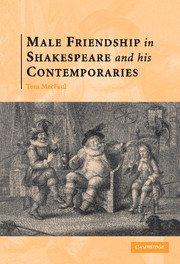Book contents
- Frontmatter
- Contents
- Acknowledgements
- Note on the text and list of abbreviations
- 1 True friends?
- 2 Momentary mutuality in Shakespeare's Sonnets
- 3 Friends and brothers
- 4 Love and friendship
- 5 Servants
- 6 Political friendship
- 7 Fellowship
- 8 False friendship and betrayal
- 9 Conclusion: ‘Time must friend or end’
- Notes
- Bibliography
- Index
8 - False friendship and betrayal
Published online by Cambridge University Press: 22 September 2009
- Frontmatter
- Contents
- Acknowledgements
- Note on the text and list of abbreviations
- 1 True friends?
- 2 Momentary mutuality in Shakespeare's Sonnets
- 3 Friends and brothers
- 4 Love and friendship
- 5 Servants
- 6 Political friendship
- 7 Fellowship
- 8 False friendship and betrayal
- 9 Conclusion: ‘Time must friend or end’
- Notes
- Bibliography
- Index
Summary
Despite the symbiotic if unequal and impermanent connections between men that can emerge in unpromising contexts such as service, politics or fellowship, friendship is most dramatically intense when it is betrayed, or when it is false in the first place. We have seen that betrayals of friendship for erotic purposes tend to be accepted in Shakespeare's plays, as erotic priorities must ultimately be accepted as taking precedence (as Benedick says, ‘the world must be peopled’ – Much Ado About Nothing, ii. iii. 242). Betrayals of political friendship are also acceptable, if lamentable, because there is no place for true friendship in the world of politics. This chapter will deal with other varieties of false and betrayed friendship which more firmly unsettle the individual's sense of his own identity, but which paradoxically create the most powerful connections between men. In betraying or feigning friendship, selfish individuals come to see the emptiness of their individualism even as they act upon it. Parolles in All's Well that Ends Well is a false friend because he is a false man, something he comes to realize in a delicious balance of tragicomic irony. Iago makes a false friendship with Othello which comes, in its twisted way, to be the truest relationship either man has. The friendships of Twelfth Night are all false or treacherous in some way, but nonetheless motivate that play's gracious action. In Antony and Cleopatra it is only through betrayal that Enobarbus becomes a significant friend to Antony.
- Type
- Chapter
- Information
- Male Friendship in Shakespeare and his Contemporaries , pp. 169 - 195Publisher: Cambridge University PressPrint publication year: 2007



